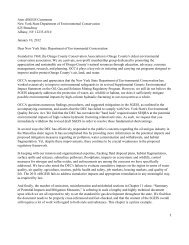Oil and Gas at Your Door? (2005 Edition) - Earthworks
Oil and Gas at Your Door? (2005 Edition) - Earthworks
Oil and Gas at Your Door? (2005 Edition) - Earthworks
You also want an ePaper? Increase the reach of your titles
YUMPU automatically turns print PDFs into web optimized ePapers that Google loves.
REGULATIONS AND SURFACE<br />
OWNER PROTECTIONS<br />
To find out which st<strong>at</strong>utes <strong>and</strong> regul<strong>at</strong>ions apply to oil <strong>and</strong> gas in your st<strong>at</strong>e, contact the government<br />
agencies listed in Chapter V. For a list of federal st<strong>at</strong>utes th<strong>at</strong> apply to oil <strong>and</strong> gas, see<br />
the public<strong>at</strong>ion Preserving Our Public L<strong>and</strong>s (to obtain a copy, see Chapter V).<br />
The following sections provide examples of various st<strong>at</strong>e, federal <strong>and</strong> county or municipal<br />
st<strong>at</strong>utes <strong>and</strong> regul<strong>at</strong>ions th<strong>at</strong> provide some protections for surface owners.<br />
Before reading about the potential regul<strong>at</strong>ory protections for surface owners, it is important to<br />
note th<strong>at</strong> even though there are st<strong>at</strong>utes <strong>and</strong> regul<strong>at</strong>ions on the books, it does not guarantee<br />
th<strong>at</strong> these protections will occur. Companies may fail to follow the laws, <strong>and</strong> their infractions may<br />
go unnoticed by the government enforcement agencies. Or governments may turn a blind eye<br />
when companies break the law — either for political reasons, or because the agencies do not<br />
have the staff to properly enforce the laws. Therefore, it is important for l<strong>and</strong>owners to learn as<br />
much as they can about the laws <strong>and</strong> regul<strong>at</strong>ions governing oil <strong>and</strong> gas in their region. If l<strong>and</strong>owners<br />
see th<strong>at</strong> laws are being broken, they can pressure government agencies to enforce the laws.<br />
STATE REGULATIONS<br />
The oil <strong>and</strong> gas industry is regul<strong>at</strong>ed primarily <strong>at</strong> the st<strong>at</strong>e level. Whether the st<strong>at</strong>e, the federal<br />
government or a priv<strong>at</strong>e party owns the minerals, generally the mineral oper<strong>at</strong>or must adhere<br />
to st<strong>at</strong>e laws <strong>and</strong> regul<strong>at</strong>ions governing oil <strong>and</strong> gas development. 394<br />
Most st<strong>at</strong>es have agencies with the specific m<strong>and</strong><strong>at</strong>e to oversee oil <strong>and</strong> gas development. For<br />
example, many st<strong>at</strong>es have oil <strong>and</strong> gas commissions, which are empowered by the st<strong>at</strong>e government<br />
to regul<strong>at</strong>e the industry. Also, n<strong>at</strong>ural resources or environmental quality departments<br />
may have the ability to regul<strong>at</strong>e certain aspects of the oil <strong>and</strong> gas industry, such as discharge of<br />
wastes. (A table of st<strong>at</strong>e regul<strong>at</strong>ory agencies <strong>and</strong> contact inform<strong>at</strong>ion can be found in Chapter V.)<br />
Even though<br />
there are laws or<br />
regul<strong>at</strong>ions on the<br />
books, it does not<br />
guarantee th<strong>at</strong><br />
these protections<br />
will occur.<br />
The following section provides inform<strong>at</strong>ion on how various st<strong>at</strong>es tre<strong>at</strong> some issues th<strong>at</strong> are of<br />
concern to surface owners. Selected examples are given of st<strong>at</strong>e regul<strong>at</strong>ions <strong>and</strong> requirements.<br />
It is not possible to include all regul<strong>at</strong>ions for all st<strong>at</strong>es in this guide. The purpose of the examples<br />
is to provide the reader with an idea of the way in which different st<strong>at</strong>es regul<strong>at</strong>e oil <strong>and</strong><br />
gas development.<br />
Leasing<br />
The direct notific<strong>at</strong>ion of individual surface owners typically does not occur when leasing of<br />
st<strong>at</strong>e or federal minerals occurs. Consequently, surface owners often do not realize th<strong>at</strong> the<br />
mineral rights have been leased to a company th<strong>at</strong> may develop oil <strong>and</strong> gas on their l<strong>and</strong>. Some<br />
st<strong>at</strong>es do have processes for posting notices about lease sales on st<strong>at</strong>e l<strong>and</strong>s. For example, the<br />
st<strong>at</strong>e agency in Montana will post notices on its web site, in local newspapers <strong>and</strong> they will send<br />
inform<strong>at</strong>ion about leases to a mailing list. 395<br />
The Interst<strong>at</strong>e <strong>Oil</strong> <strong>and</strong> <strong>Gas</strong> Compact Commission has produced a table th<strong>at</strong> summarizes st<strong>at</strong>e<br />
oil <strong>and</strong> gas leasing inform<strong>at</strong>ion, including how the st<strong>at</strong>e agencies notify the public about lease<br />
sales. This table is available <strong>at</strong>: http://www.iogcc.st<strong>at</strong>e.ok.us/STATELANDLEASINGINFO.htm<br />
II-11




